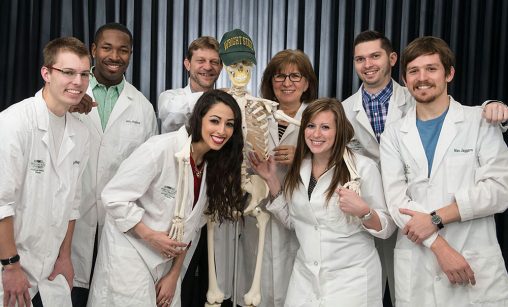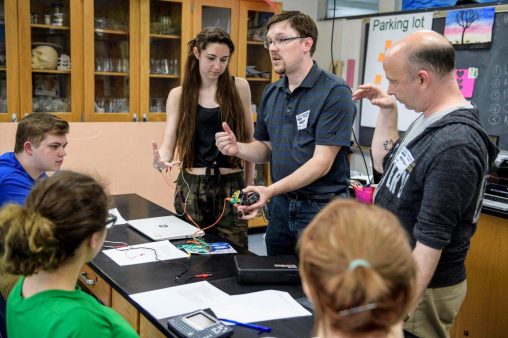
The Human Anatomy and Physiology Interactive (HAPI) Lab is an interactive anatomy and physiology lab for regional high school students.
Wright State University received a $20,000 grant from the CareSource Foundation to expand the HAPI Lab (Human Anatomy and Physiology Interactive Lab) and NeuroLab programs.
The HAPI Lab and NeuroLab are interactive on-campus labs for regional high school students offered since 2014 by faculty members and undergraduate and graduate students from the Department of Neuroscience, Cell Biology and Physiology in the Boonshoft School of Medicine and the College of Science and Mathematics at Wright State.
The HAPI Lab is run by Bridgett Severt, lecturer in the Department of Neuroscience, Cell Biology and Physiology. The interactive anatomy and physiology lab helps to enrich students’ understanding of the human body, introduces them to career options and exposes students to opportunities at Wright State.
Patrick Sonner, Ph.D., lecturer and director of the Undergraduate Neuroscience Program, and Christopher Wyatt, Ph.D., associate professor and associate chair of the Department of Neuroscience, Cell Biology and Physiology, run the NeuroLab sessions. The NeuroLab gives high school students the opportunity to conduct experiments, collect data and learn about neuromuscular physiology in an engaging way. Students are also introduced to the field of neuroscience.
Both programs are offered in 90-minute, single-session labs, available to groups of up to 30 regional high school juniors, seniors and their teachers on Friday mornings during the spring semester. Students are also provided lunch and a brief presentation about what is available to them at Wright State, emphasizing the region’s needs and opportunities for well-trained health care professionals.
The CareSource Foundation grant will allow for the expansion of the HAPI Lab and NeuroLab with the goal of increasing access to underserved student populations from rural and urban communities.
“The ultimate goal of both programs is engaging young people with the idea of developing the next generation of health care providers,” said Eric Bennett, Ph.D., professor and chair of the Department of Neuroscience, Cell Biology and Physiology. “This grant will help to expand the program and to ensure greater access to underserved rural and urban communities, making sure that these kids have the opportunity to participate.”

Patrick Sonner, center, and Christopher Wyatt, right, faculty members in the Department of Neuroscience, Cell Biology and Physiology, run the NeuroLab sessions, which teaches high school students about neuromuscular physiology and neuroscience.
In prior years, the HAPI Lab and NeuroLab each offered 12 sessions during the spring semester, for a total of 24 sessions.
“Thanks to the CareSource Foundation grant, we were able to add an additional NeuroLab per week, increasing our capacity to 36 slots. With a typical 25 to 30 students per class, at 36 sessions, we will bring somewhere between 800 and 1,000 students to campus in spring 2023,” said Bennett.
The programs serve schools throughout the Miami Valley and as far away as Cincinnati, Columbus and Piqua. Because of their extreme popularity, Bennett said that prior to the expansion of the number of available slots, both programs would fill up in a matter of hours after the online application site was opened.
While 12 HAPI Lab sessions and the first set of NeuroLab sessions are filled, some dates are still available in the second set of NeuroLab sessions.
Reservation requests can be made by completing an online application.
Bennett said that the Department of Neuroscience, Cell Biology and Physiology plans to offer a CardioLab, which will give students a similar interactive experience to the HAPI and Neuro labs with a focus on the cardiovascular system. For more information, contact Bennett at eric.bennett@wright.edu.

 Adventures await
Adventures await  Wright State to expand nursing facilities to meet workforce needs and prepare more graduates for in-demand careers
Wright State to expand nursing facilities to meet workforce needs and prepare more graduates for in-demand careers  Wright State student-athletes make a lasting impact on local family with more to come
Wright State student-athletes make a lasting impact on local family with more to come  Wright State names Rajneesh Suri dean of Raj Soin College of Business
Wright State names Rajneesh Suri dean of Raj Soin College of Business  ‘Only in New York,’ born at Wright State
‘Only in New York,’ born at Wright State 